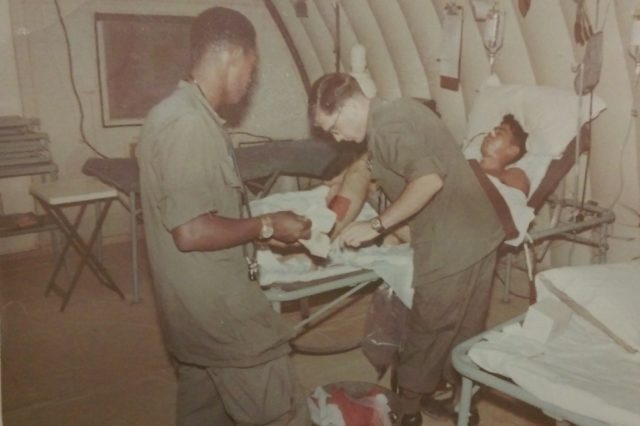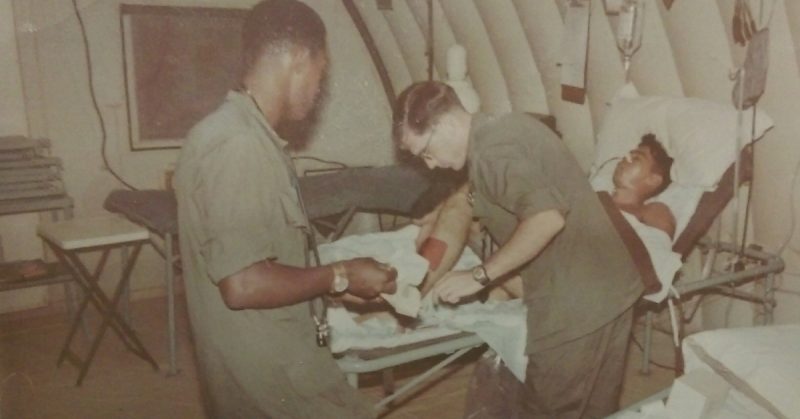War History online proudly presents this Guest Piece from Jeremy P. Ämick, who is a military historian and writes on behalf of the Silver Star Families of America.
In October of 1967, only months after receiving his draft notice from the U.S. Army, Lohman, Mo., resident Roger Buchta completed his boot camp and training as a combat medic, and then boarded a plane to apply his newly acquired medical skills in Vietnam.
Upon arrival, he was assigned to a mobile army surgical hospital (MASH unit) and given an abrupt introduction to the harsh realities of war, treating various ailments and combat injuries. When the Christmas season arrived two months later, Buchta witnessed an event that would help breathe some humanity into otherwise deadly conditions.
“It was sometime around Christmas 1967,” recalled Buchta, “and the winds swept in off of the South China Sea and lashed at our rickety tents. I was with the 18th Army Surgical Hospital and we were located in the Quang Tri Province, a small military outpost that was only three miles south of the demilitarized zone that separated North and South Vietnam,” he added.
As Buchta explained, it was a slow time for those working in the hospital while the medics and nurses endured the monsoon by tending to the few patients recovering from surgery. When not occupied with other duties, he said, the staff passed the time by “playing cards, drinking coffee and generally enjoying a break from the stress of receiving and preparing causalities for emergency operations.”
The howling of the wind and seemingly incessant splattering of the rain against the sides of the tents was soon interrupted when an older Vietnamese man slowly opened the door to the emergency room, accompanied by a young Vietnamese woman who appeared to be in a great deal of pain.
“We (medical staff) attempted to use our limited Vietnamese vocabulary to figure out the source of her discomfort,” said Buchta, “but it was to no avail. Finally,” he continued, “the man pointed to the lady’s stomach and pretended as if he were rocking a baby— and that’s when we realized she was ready to give birth. (A medical situation, he said, for which the medics were not trained to address.)
A nurse on duty quickly located one of the Army doctors who fortunately happened to be an obstetrician. After examining the patient, the doctor announced that the woman would not only give birth once, but twice.
“The doctor proclaimed, ‘She is going to have twins!’” recalled Buchta.
The doctor’s assessment also revealed that the infants would be premature, which then resulted in the search for an incubator. The MASH unit staff was able to locate one aboard a hospital ship anchored off the coast only a few miles away, but due to the storms ravaging the area, the helicopters needed to deliver the medical equipment were grounded.

The approach of dawn brought with it a small glimmer of hope when the sun began to pierce the clouds. As the harsh weather began to subside, a pilot was located, agreeing to retrieve the incubator from the hospital ship.
“After a brief time, a nurse from the operating room opened the emergency room door and announced the lady was the mother of twin girls,” Buchta smiled. “It was truly a novel experience for us all; after seeing and dealing with death and wounds day after day, this was new life … and, after all, it was Christmastime as well.”
The new mother and her twin daughters were taken to the post-operation area; the twins were healthy enough that the incubator was never required. Through the assistance of an interpreter, the mother asked to see all of the emergency room personnel who cared for her throughout the delivery, informing the staff she would like for them to name her children.
Perplexed, the medics wondered what would be appropriate names for the girls when Buchta noticed the mother wearing a necklace with a cross.
“She was Catholic,” Buchta explained, “and I suddenly thought, ‘What about good strong Catholic names: Mary and Martha?’”
When the mother learned of the new names for her children, she was elated, Buchta noted—a joyous experience that served as the capstone event of the young medic’s Christmas celebration of 1967 and the year he spent in Vietnam.
Nearly five decades have passed since the birth of Mary and Martha during the Vietnam War, yet Buchta admits that throughout the intervening years, he has often wondered what became of the two young girls he helped to name.
“The girls were so small I remember holding each one in my hand,” he said. “(The family) disappeared soon after the girls were born; the South Vietnamese military came and took them away. They were probably taken to the civilian hospital a few miles away in Quang Tri,” he added.
In late January 1968, North Vietnamese forces briefly overran Quang Tri and several other cities in what is known as the Tet Offensive—a coordinated effort to collapse the government of the Republic of South Vietnam. Though the enemy forces were quickly repelled, it was a memorable event for Buchta, who remains uncertain as to how the twins were affected.
“Sadly, I have no idea what became of the girls or their family, but being able to experience their birth is one of the better memories I have from my service and was a rather unique situation considering the combat environment to which we were accustomed.”
